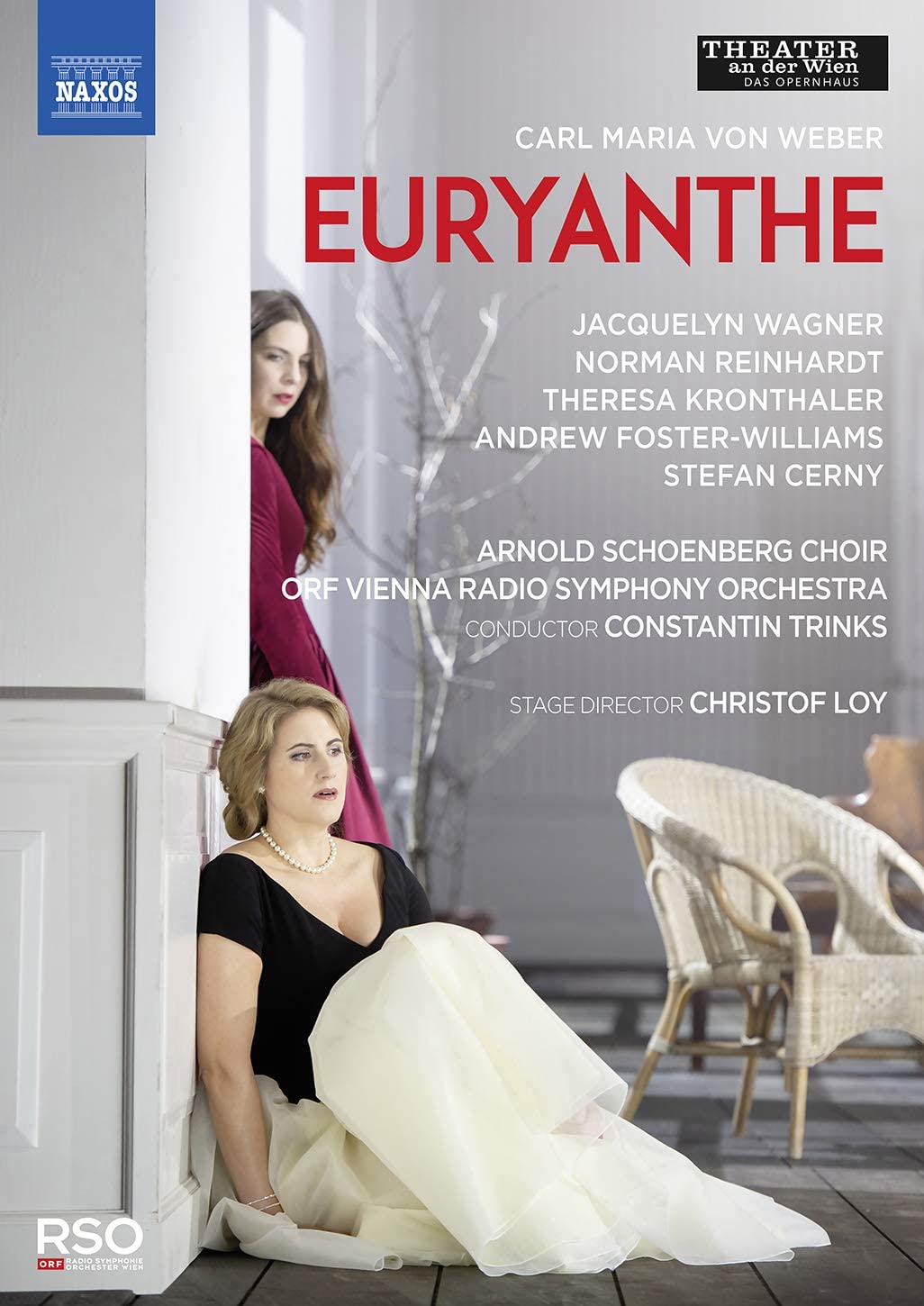WEBER Euryanthe (Trinks)
View record and artist detailsRecord and Artist Details
Genre:
Opera
Label: Naxos
Magazine Review Date: 06/2020
Media Format: Digital Versatile Disc
Media Runtime: 167
Mastering:
DDD
Catalogue Number: 2 110656

Tracks:
| Composition | Artist Credit |
|---|---|
| Euryanthe |
Carl Maria von Weber, Composer
(Arnold) Schoenberg Choir Andrew Foster-Williams, Lysiart, Bass-baritone Constantin Trinks, Conductor Jacquelyn Wagner, Euryanthe, Soprano Norman Reinhardt, Adolar, Tenor Stefan Cerny, Ludwig VI, Bass Theresa Kronthaler, Eglantine, Mezzo soprano Vienna Radio Symphony Orchestra |
Author: Mike Ashman
This is the visual side of the CD release I reviewed last November (Capriccio). The control, order and purpose of the production filmed here were predictable from the musical side of the performance: it’s a classic example of the modern minimalist staging that Christof Loy has been perfecting over the years. You’ll only be disappointed if you’re indissolubly wedded to lavish period scenery and spectacle for this medieval French fiction – and see the disadvantages of over-medieval dressing up, camp and irrelevant, on various YouTube excerpts.
Like much of Loy’s recent work the production is set in a large white room with minimal furniture (Johannes Leiacker is the designer). The cast are dressed formally as if for a modern concert (costumes by Judith Weihrauch) but with obvious reference to their social and dramatic status within the work (the Huntsmen are allowed folkish hats and trousers for their famous Act 3 chorus and Eglantine, as the outsider, a maroon red dress until her intended wedding to Lysiart). Economy throughout is the watchword here.
Exits, entrances and scenery moves are used for major events only – for example, the desolate place at the start of Act 3 where Adolar brings Euryanthe to kill her is effectively suggested by just clearing the room of the bed and piano that were previously there. And, although no monstrous serpent appears to threaten the principals’ lives in this scene, the danger and tension are clearly represented in their acting. Watch also the climax of Eglantine’s and Lysiart’s spooky Act 2 vengeance duet where the two singers end up in a kind of forced erotic heap in the corner, a virtuoso action that perfectly suggests their impromptu alliance.
The end result keeps the audience’s imagination profitably in play and provides uncanny concentration on the drama of Helmina von Chézy’s libretto, here revealed as more psychological drama than action fairy story. The cast and their movements mirror up to their characters – the ‘goodies’ Euryanthe and Adolar tall and fair and more stately, the ‘baddies’ Eglantine and Lysiart shorter and darker and more bendy and flexible.
The filming from two performances in December 2018 is intelligently geared to the staging, balancing well detail and overview. Sound and vision are both in good order. Small cuts include the elimination of two of the minor characters (basically extended chorus solos) but do not damage the impression that, under Constantin Trinks’s well-judged handling of both dynamics and dramatic atmosphere, this is the most approachable and effective Euryanthe yet in the current catalogues
Discover the world's largest classical music catalogue with Presto Music.

Gramophone Digital Club
- Digital Edition
- Digital Archive
- Reviews Database
- Full website access
From £8.75 / month
Subscribe
Gramophone Full Club
- Print Edition
- Digital Edition
- Digital Archive
- Reviews Database
- Full website access
From £11.00 / month
Subscribe
If you are a library, university or other organisation that would be interested in an institutional subscription to Gramophone please click here for further information.




